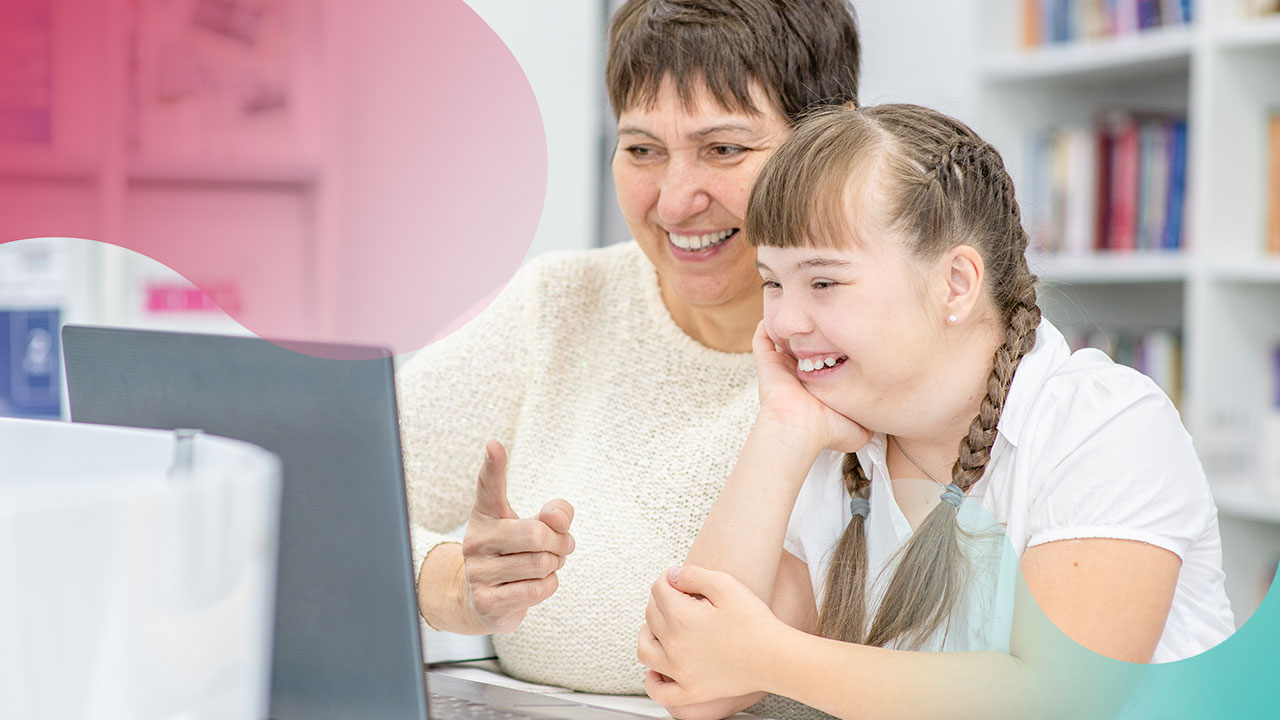


A Full-Day Webinar Workshop for Educators
For more than 25 years, the Down Syndrome Resource Foundation has offered a wide variety of programs, services, and resources for individuals with Down syndrome of all ages and their families. Our mission is to support people living with Down syndrome and their families with individualized and leading-edge educational programs, health services, information resources, and rich social connections so each person can flourish in their own right.
At our first full day webinar for educators, our diverse team of professionals will share strategies and knowledge to support the learning goals of the students you work with.
These webinars are pre-recorded and will be released on October 21, 2022, with replay access until April 15, 2023.
Registration includes exclusive access to a special live panel Q&A with our multi-disciplined team on Wednesday, November 30, 2022 at 3:30pm (PST).
For any special accommodations or assistance with resources, please email us.
Professional: $200 for one stream or $350 for both streams
Non-Professional/Family: $185 for one stream or $325 for both streams
Profiles of Learning and Development in Down Syndrome
Participants will learn what we currently know about the overall characteristics and learning style of people who have Down syndrome, and how we can effectively apply this knowledge. The impact of health factors, cognitive development, and physical and sensory needs will be discussed.
Optimizing Communication at School: Top Tips from SLP
From this presentation, participants will learn strategies to help support students with Down syndrome’s understanding and engagement in the classroom. General characteristics of communication strengths and challenges in students with Down syndrome and ways to improve communication with peers and promote social interaction will also be discussed.
Early Literacy and Math: Key Concepts for Learners with Down Syndrome
The DSRF Teachers will share strategies for teaching key concepts to early learners with Down syndrome. Participants will leave this workshop with a better understanding of how to use their limited instructional time to make the most impact.
Foundational Concepts in Comprehensive Sexual Health Education: Where to Start, Where to Go!
Understand how concepts including basic body science, emotions, privacy, consent, and bodily autonomy can be taught at any age and why these topics are important in relationships, independence, and abuse prevention.
Access Granted: Promoting Independence and Accessibility in the Classroom
Learn how to set your students with Down syndrome up for success with strategies to support independence and engagement in a classroom setting. This presentation will delve into the physical, cognitive and environmental domains while also focusing on adapting/modifying activities and providing support through adaptive equipment.
Top 5 Strategies for Positive Behaviour Support
Positive Behaviour Support is a values-focused, evidence-based approach to addressing problem behaviours. PBS principles and strategies tailored to students with Down syndrome will be shared to help educators and promote appropriate behaviour and interactions from an early age.
Profiles of Learning and Development in Down Syndrome
Participants will learn what we currently know about the overall characteristics and learning style of people who have Down syndrome, and how we can effectively apply this knowledge. The impact of health factors, cognitive development, and physical and sensory needs will be discussed.
Tricky Transitions
Transitions between places or activities at school are often reported as being one of the most common causes of problematic behaviour in students with Down syndrome. This is especially frustrating when we consider how many transitions, big or small, happen throughout a school day. In this webinar, the reasons why moving from one thing to the next can be so challenging for individuals with Down syndrome will be discussed, as well as the top positive behaviour support strategies to help promote more successful transitions.
Totally Included: Augmentative Alternative Communication (AAC) Guide for Educators
Learn how and why AAC is effective for supporting students with Down syndrome. This presentation gives an overview of AAC use in academic and social interactions. Participants will leave with practical strategies that can be used right away in the classroom.
Common Sense(s): Deep Dive into Sensory Processing Issues in School
Our sensory system allows us to feel, see, hear and experience the world in a variety of ways and while many of us perceive the world through thought and language others may perceive the world through sensation and action. This presentation will focus on the 8 senses, examine how sensory processing differences can present themselves within a school context, and identify strategies to assist your students with self-regulation.
Applying Math and Reading Skills In Real Life
Generalizing skills learned in the classroom to everyday life can be a challenge for many learners with intellectual disabilities. This workshop will focus on skills learners need to know and provide suggestions for varied practice with the goal of generalization and independence.
Clear Boundaries for Healthy Relationships: Exploring Crushes, Dating and Consent in the School Setting
We want respectful, satisfying, and pleasurable social and romantic lives for the people we support with Down syndrome. Explore common questions about unexpected or inappropriate touch in the classroom, crushes on classmates or school staff, and dating. Learn about how to establish clear boundaries while modelling healthy relationships and consent practices in a school setting.